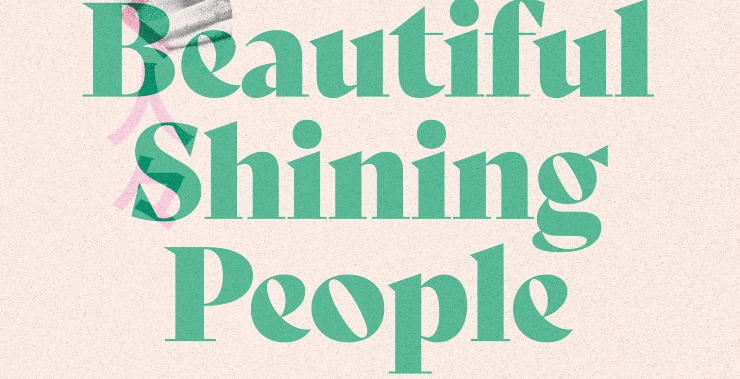Blog tour: Beautiful Shining People by Michael Grothaus

This post is part of a blog tour organised by Random Things Blog Tours. I received a free copy of the book in return for an honest review.
‘It’s our world, but decades into the future…
‘An ordinary world, where cars drive themselves, drones glide across the sky and robots work in burger shops. There are two superpowers and a digital Cold War, but all conflicts are safely oceans away. People get up, work, and have dinner. Everything is as it should be…
‘Except for seventeen-year-old John, a tech prodigy from a damaged family, who hides a deeply personal secret.
‘But everything starts to change for him when he enters a tiny café on a cold Tokyo night. A café run by a disgraced sumo wrestler, where a peculiar dog with a spherical head lives alongside its owner, enigmatic waitress Neotnia…
‘But Neotnia hides a secret of her own – a secret that will turn John’s unhappy life upside down. A secret that will take them from the neon streets of Tokyo to Hiroshima’s tragic past to the snowy mountains of Nagano.
‘A secret that reveals that this world is anything but ordinary – and it’s about to change forever…’

Beautiful Shining People, by Michael Grothaus, is set in Japan in the 2040s, where seventeen-year-old American programmer John is staying while waiting to seal a deal with Sony for a novel translation app he’s written using quantum code, which is opening up new possibilities.
Lonely and not sure what to do with himself, one night John visits a café, where he meets former sumo wrestler Goeido - its owner - young waitress Neotnia, and her unique-looking dog, Inu. John grows close to Neotnia, and eventually wins over her protective boss, too.
Neotnia’s first revelation is that she went to stay and work with Goeido when her father disappeared, a year previously - who was he, and where did he go? Her second and third ones… well, I’ve hidden those (and aspects of my review relating to them) from immediate view, to avoid spoiling the story!
I really enjoyed Beautiful Shining People. As speculative/sci-fi stories go, it presents a relatively optimistic and soft vision of the future, where robots have relieved humans of menial tasks, as opposed to taking over the creation of art, music, and books, or replacing interaction with other people.
While there are certainly international tensions - in fact, John’s father lost his life a few years back while working as a medic during a war in Angola - at the time and place the story is set, things are more or less business as usual.
Even though technology has advanced to the point that robots, self-driving cars, and AI-controlled infrastructure are integral to everyday life, the world of Beautiful Shining People is far from unrecognisable. Technology can still be temperamental and janky; for instance, we encounter an entertaining self-driving counterpart to the “old banger”.
People have held on to things that matter: in Japan, the Shinto tradition of venerating kami with shrines and temples is retained; sumo continues with its long-established rules, customs, and superstitions intact; and the atomic bombings of Nagasaki and Hiroshima in 1945 are still commemorated and live on in popular memory.
Something else that’s reassuringly familiar is the course of young love. We follow John and Neotnia as they go to the cinema; celebrate Halloween with Goeido; spend a day in the care home where Neotnia regularly volunteers; go for a spontaneous, illicit swim; and drink instant hot chocolate while watching TV together. We also witness John’s relateable insecurities that Neotnia couldn’t possibly be interested in him.
This first third of the book is therefore rather pleasant and heartwarming, and it’s fun to get to know the characters (and watch them get to know one another) and Grothaus’ imaginative future versions of Tokyo and the world at large.
Just as I started to wonder where all this was going, the revelations and action kicked in. As these form the basis of two-thirds of the book, I naturally have further thoughts and opinions I’m keen to share. As mentioned previously though, I don’t want to spoil the surprises for anyone - so please don’t click on the next line if you don’t want to know what happens next!
Here be spoilers, as well as (relevant, non-graphic, non-titillating) references to genitalia
The big bombshell is... Neotnia and Inu are androids so highly advanced, they're indistinguishable from actual humans and dogs. Neotnia has an error in her quantum code that causes her to have painful fits, and she hopes John can hack into her system and fix it.
Neotnia is worried about, misses, and has questions for the man who created her, leading to a road trip with John and Goeido to track him down, courting danger from those who would use Neotnia's codebase for espionage and warfare.
The pace and stakes of the story therefore really pick up after this revelation. It also gets super thought-provoking.
Following the trail back to her "father", Neotnia learns that she was originally designed to address the shortage of young workers available to care for an ageing population, as well as the lack of intuition, flexibility, and compassion in existing bots that makes them unable to effectively assist frail, lonely elderly people.
Before she learns about the exact nature of her final code, which essentially gives her free will, this leads Neotnia to question whether she volunteered in the care home because she wanted to, or because she was pre-programmed to, and whether being created with a specific purpose in mind is the one big thing that sets her apart from humans.
This got me thinking about people's motivations for having children. How different is Neotnia's situation to that of someone whose parents' key reasons for having them were (for example) to have a relative to look after them in old age, to create a compatible medical donor for a sick sibling, or mould their child into an international tennis champion?
I suppose the difference is choice - people in the aforementioned examples can (theoretically, at least) opt out of their "fate", whereas Neotnia, as she was originally designed, wouldn't even be able to consider a vocation other than care work.
What about genes and environment? We can spot correlations between certain genes and illnesses, and growing up in challenging circumstances and particular outcomes. However, these are only trends. It's not inevitable someone with a specific gene will get sick, as it might be affected by other genes, lifestyle factors, or pure luck.
Nor is it always the case that someone with a high number of adverse childhood experiences (ACEs) will turn to crime and/or develop a severe mental illness - there are so many other factors, such as individual character, or having the right teacher/counsellor/friend/opportunity at the right time, that can alter their path. Again, Neotnia's path would have been unalterable if she'd been developed as initially planned.
The possible uses of incredibly human-like androids in international affairs also got me thinking. As Grothaus points out, this would not only allow countries to spy on one another more effectively, but it would engender intense paranoia, as people wouldn't know who they could trust among their neighbours and colleagues, and might report anyone they perceive as "a bit off" as suspected androids.
One of Neotnia's burning questions concerns her lack of primary sexual characteristics. She finds out that she wasn't given these because, as an android originally designed purely to care for people, it was not envisaged that she would need them.
This adds another layer to the themes of autonomy and intention versus eventuality. It also prevents John from going all the way with Neotnia before finding out she's an android, which would have generated a whole load of extra issues for him in terms of ethics and informed consent.
However, I do wish the author had used the term "vulva" rather than "vagina" as, from the sounds of it, the whole area is a smooth Barbie mound for Neotnia, and I'd argue that having no vulva is more of an issue than having no vagina, as penetration really isn't the be-all and end-all.
Also, Neotnia believes that not having a vagina (sic) and not being able to have sex marks her out from all other women. I'd like to think that by the 2040s, such gender essentialism will be a thing of the past, and nobody will find themselves thinking they're not "woman enough" because of the appearance and/or function of their genitals.
Beautiful Shining People is inventive, bittersweet, and thought-provoking.
